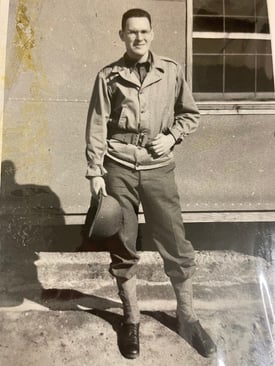

1942: A CALL TO SERVICE
In December of 1942, Dan enlisted for active duty. Assigned to The Army Specialized Training Program as a public relations specialist, his training included language, psychological warfare, and propaganda — the history and application.
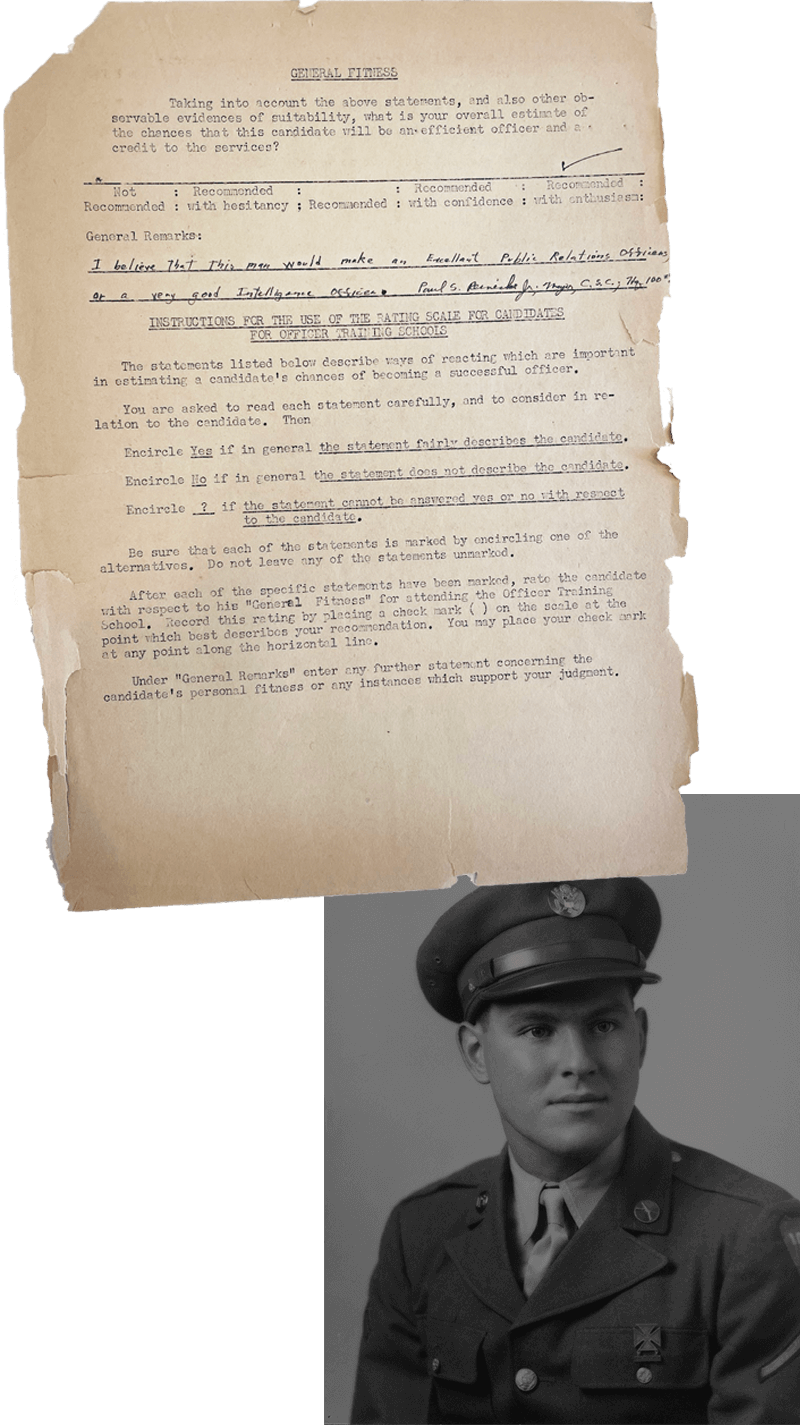
During his training Dan’s superiors recognized his abilities and recommended him for public relations and intelligence.
1943: FORT JACKSON, SC
During his training in Fort Jackson, Dan used his reporting and communication skills to combat the propaganda machine he would face overseas. Joining the psychological and publicity division, Dan began to constantly observe enemy news and media.
Dan in Fort Jackson, South Carolina during training.
.png)
November 15, 1944: Dan received his orders to join the Fifth Mobile Radio Broadcasting Company, stationed outside London. While crossing the Atlantic, he listened to radio news reports and produced a daily newspaper.
.png)
Dan at Fort Jackson.
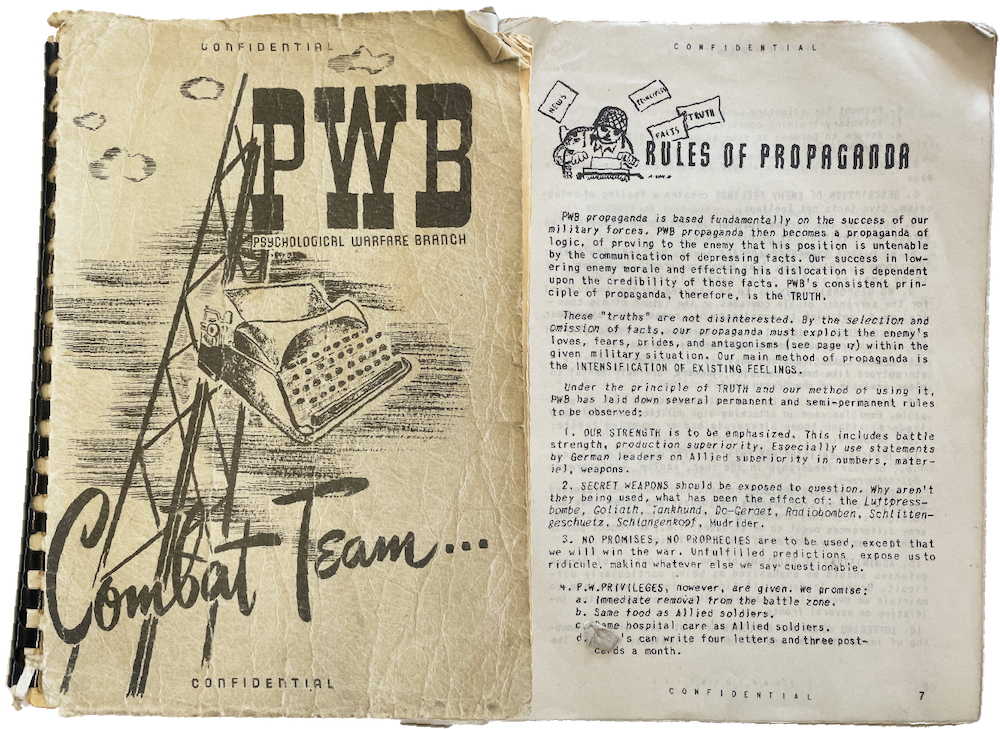
In the psychological warfare unit, Dan gained insight into the enemy morale. The unit would attack the enemy and demand surrender through the use of leaflets, pamphlets, and broadcasts.
FALL 1944:
BOOTS ON THE GROUND
In August of 1944, Dan's assignment came to join the 5th Mobile Broadcast Unit, for which he was headed to Europe and the theater of war. His trip across the Atlantic was spent listening to the enemy news and radio broadcasts and developing a unit circulation.
A piece of music written by Dan and his unit. Morale was often hard to maintain during the height of war. The 5th Mobile combined creativity with grit and intellect to maintain support among the troops.
.png?height=1700&name=Song%20(1).png)
November 17, 1944: Dan’s one-way plane ticket from London to Paris.
.png)
The 5th Mobile Radio Broadcasting Co. was created during WWII to boost morale among the troops. Music, news from home, live concerts, and variety shows were produced and broadcast from the mobile platform. As part of the psychological warfare division, the unit was responsible for the creation and distribution of leaflets and media.
.png)
August 14, 1944: Traveling across the Atlantic, Dan listened to enemy broadcast reports through the night and wrote a daily newspaper called Rail Call containing his findings — these reports would soon become detailed analyses of enemy claims.
WINTER 1944:
THE WAR ON WORDS
The War on Words was crucial for Allied success. With the psychological warfare division, Dan studied each word of the enemy broadcast and developed nightly reports and analysis. After listening to the reports through The Hellschreiber (a device that transcribed on paper tape via radio lines rather than landlines), Dan would edit, analyze, and point out the most urgent issues that should be taken up to counter the enemy propaganda.
November 26, 1944: Enemy forces are claiming the Allies are losing the Battle of Attrition. Although the Minister of Propaganda remarked the German defense was stronger than ever, the reality was they were using their reserves. Dan’s media suggestion indicated a focus on the turn in Italy and Poland.
.png)
.png)
November 29, 1944: Enemy broadcast report by Dan. The enemy claims they have new defensive power, despite Russians making headway and the German evacuation of Sworbe. Dan was responsible for reporting on what was said by the enemy and what in reality was happening.
January 1, 1945: A page from Dan’s report of Hitler and Goebbel finally break a six-month media blackout with a speech that claims the Allies had lied about their territory gains — and that Germany would prevail. The speech offered no information on the battlefield situation or any hint that the Germans were losing the war, and it was nearing an end.
%20(1).png)
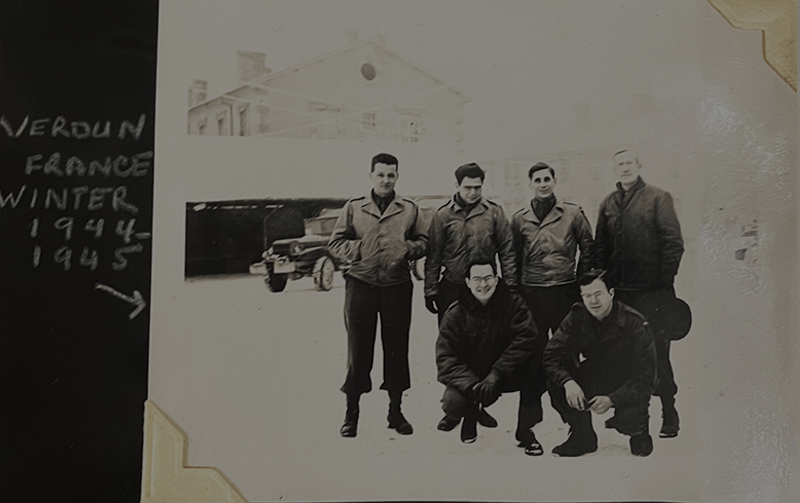
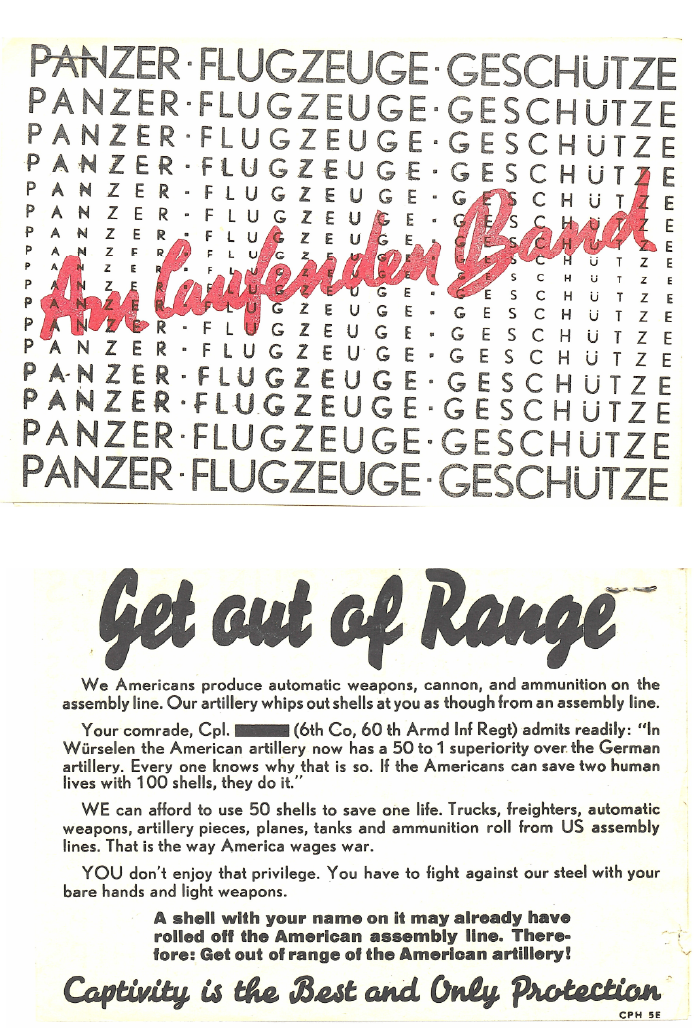
Dan wrote leaflets for the 5th Mobile Radio Broadcast Unit. They were written in English and translated into German, and dropped over German towns via bombers. These leaflets alerted the enemy that shelling will take place: "Get out of Range." The success of the leaflets distributed by the psychological warfare division was recognized as an effective combat tool.
.png?height=1700&name=HITLER%20VDEAD%20(2).png)
April 30, 1945: Hitler is found dead.
1945: VICTORY
In 1945, the War in Europe was declared over but the psychological warfare division wasn’t finished. The unit became the information control division. Dan and his unit were responsible for the control and restructuring of the German press, radio, theater, and film. In order to rebuild German media Dan would help develop and conduct opinion research surveys on the German people and former members of the press.
Dan's unit developed Frontpolt, a circulation created to combat propaganda, which would eventually become Der Spiegel after the unit had properly vetted a staff.
-1.png)
Spring/Summer 1945: During the rebuilding of German media and entertainment, the vetting of individuals determined their ability to return to their previous positions. Dan profiled individuals like Rummel and Bustabo — both soloists traveled and performed for the Nazi party.
.png)
.png)
.png)
July 20, 1945: The nightly broadcast reports became weekly summaries in the Spring/Summer of 1945. Dan continued to analyze and provide feedback on broadcasts.
The Allied Forces announced that reparations would be the first priority. The German prisoners of war would begin rebuilding Soviet towns and factories immediately. Dan’s report emphasized the need to ensure illegal radio broadcasts were being monitored.
.png)
December 24, 1945: Dan developed post-war surveys used to rebuild all factions of German media.
1945-46: NUREMBERG TRIALS
The Nuremberg trials were held by the Allies against representatives of the defeated Nazi Germany, for plotting and carrying out invasions of other countries, and other crimes, in World War II. Before the Nuremberg trials began, lawyers for the defense began to gather witnesses. Dan conducted profiles on the individuals detailing their whereabouts during the Nazi regime. The lawyers attempted to show the defendants believed they served a good cause and that the Nazi party had no criminal character. The interviews made it clear these claims were entirely false; the Nazi party kept detailed logs which contained dates, locations, and daily activities of party leaders. The trial lasted eleven months, and the evidence included more than 600 prosecution exhibits, 1,400 defense exhibits, and the testimony of more than 100 witnesses.
December 8, 1945: Dan proposed that a press conference be held to survey public opinion on the Nuremberg trials. An estimated 400-500 individuals were surveyed by the Information Control Division; 81% of those surveyed believed the trials would be fair.
-1.png)
-1.png)
December 28, 1945: Interviews with German community leaders were held to gauge their opinion of the trial. One individual was a journalist who had little hope the trials would matter to most Germans, but remained optimistic that it would be an opportunity for many to gain insight on the history of the previous twelve years.
-1.webp)
November 20, 1945: Seating Chart of Defendants at Nuremberg. Dan made annotations of the defendants during the trial and developed profiles of each individual.
1946: BERLIN
In 1946, Dan was transferred to Berlin where he became a reports officer. He compiled his postwar surveys and work on psychological warfare into reports that would be circulated to his officers.
January 15, 1946: The Information Control Division concluded after evaluation that the foremost conductor, Wilhelm Furtwängler, would not be permitted entry into the United States, citing his strong ties to the enemy party, including holding a titled position within the party.
-2.png)
Dan surveyed different media factions to determine their postwar sympathies. Working with psychiatrists, Dan and his unit created profiles that would be used to establish if someone would be suitable for their previous role.
%20copy%202.png)
%20(1).png?height=1700&name=Museum_PENULTIMATE%20(2)%20(1).png)
%20copy%203.png)
As a reports officer, Dan compiled his opinion research surveys, which were used by information control to rebuild media platforms.
1946: RETURNING HOME
After completing work in Berlin, Dan returned to the United States in the Spring of 1946. His awards included an Army Commendation ribbon, ETO ribbon with four battle stars, Germany occupation ribbon, American Theater ribbon, and the Good Conduct Ribbon. His voyage home would bring the next chapter in his legacy.
March 1, 1946: A letter of commendation was written by General Adcock to acknowledge the work Dan had done in the Intelligence Unit, highlighting his exceptional daily intelligence reports and ability to act as a liaison between the Army and the press.
-1.png)


1942: A CALL TO SERVICE
In December of 1942, Dan enlisted for active duty. Assigned to The Army Specialized Training Program as a public relations specialist, his training included language, psychological warfare, and propaganda — the history and application.
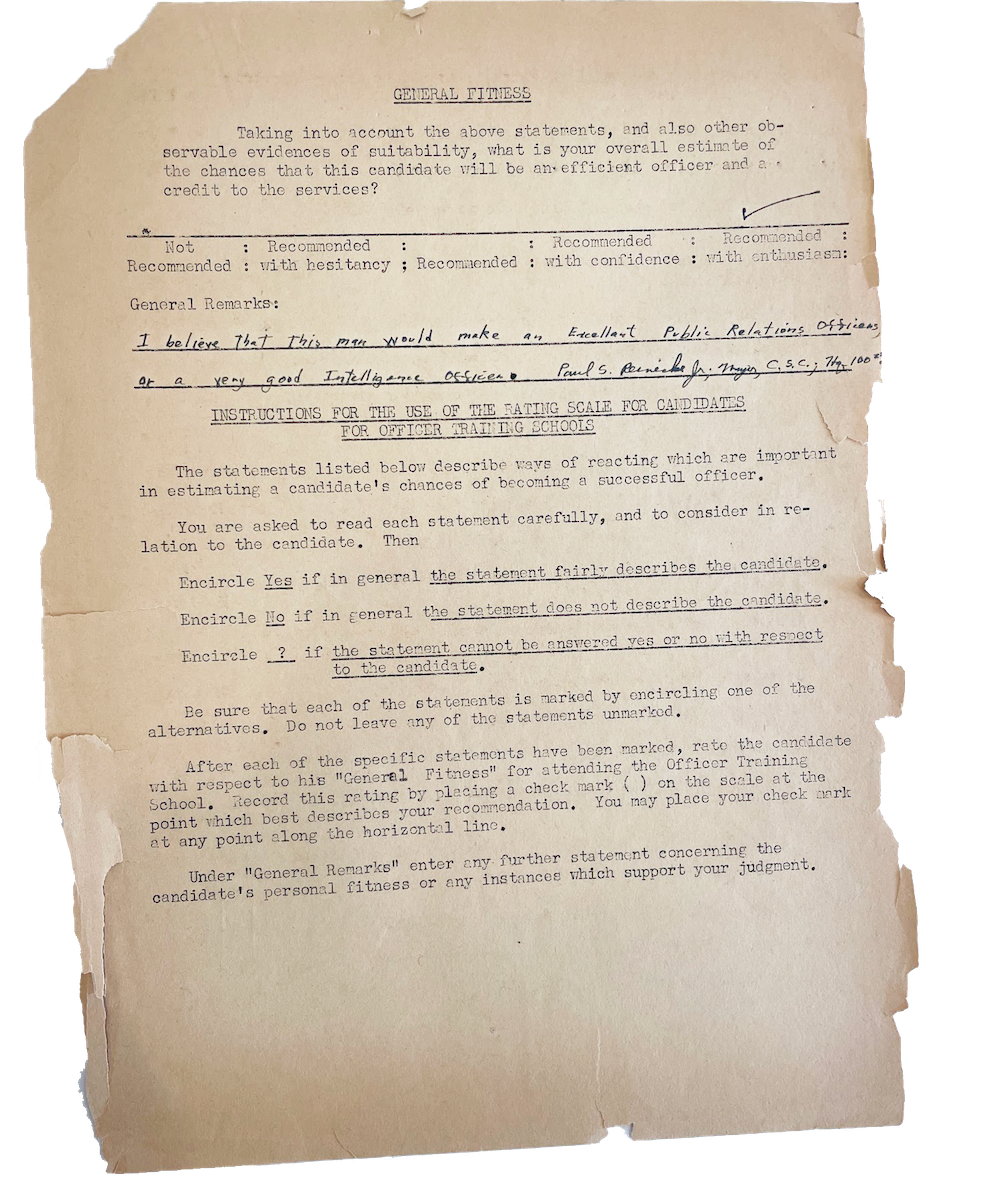
During his training Dan’s superiors recognized his abilities and recommended him for public relations and intelligence.
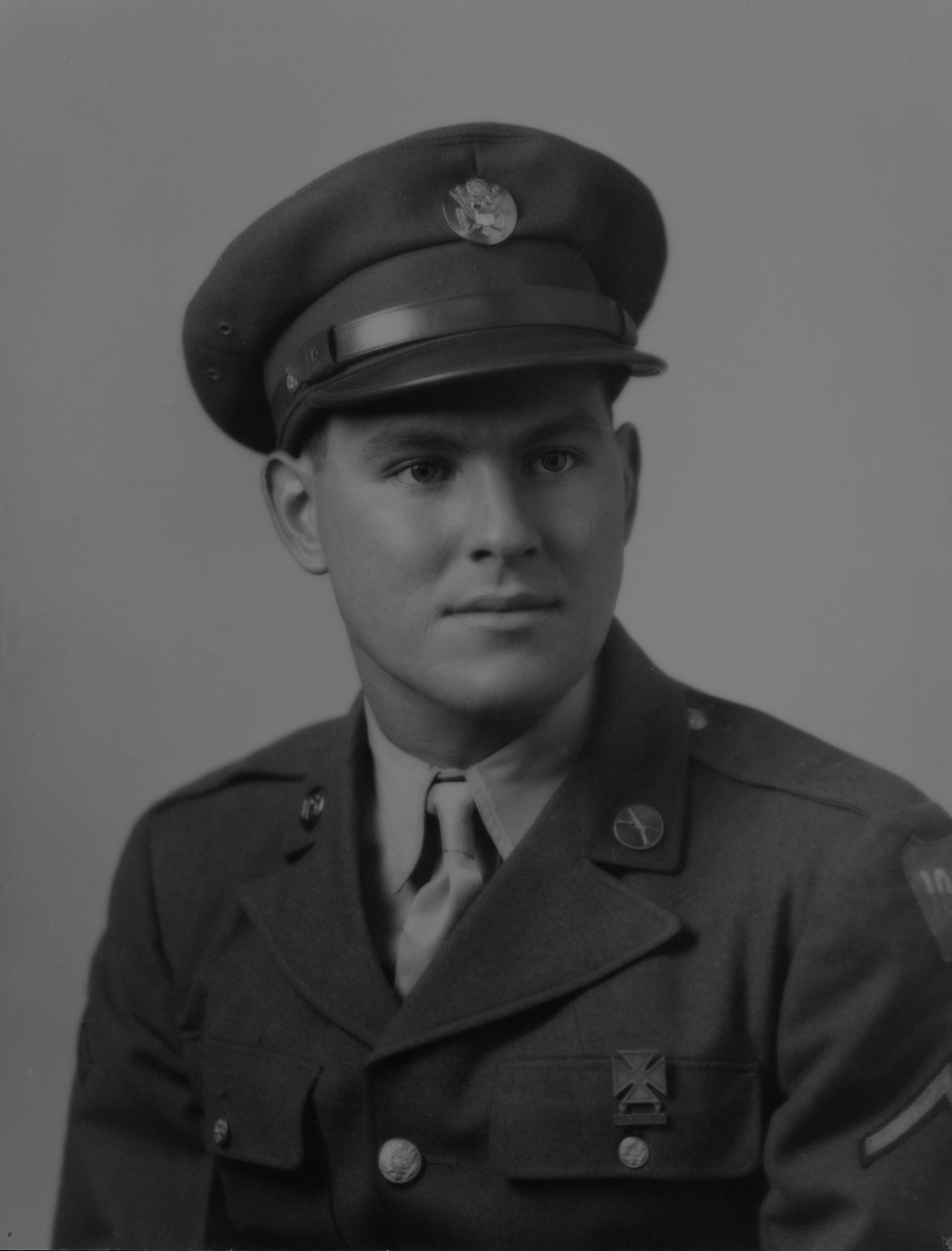
During his training Dan’s superiors recognized his abilities and recommended him for public relations and intelligence.

1943: FORT JACKSON, SC
During his training in Fort Jackson, Dan used his reporting and communication skills to combat the propaganda machine he would face overseas. Joining the psychological and publicity division, Dan began to constantly observe enemy news and media.
Dan in Fort Jackson, South Carolina during training.
Dan in Fort Jackson, South Carolina during training.
.png)
November 15, 1944: Dan received his orders to join the Fifth Mobile Radio Broadcasting Company, stationed outside London. While crossing the Atlantic, he listened to radio news reports and produced a daily newspaper.
November 15, 1944: Dan received his orders to join the Fifth Mobile Radio Broadcasting Company, stationed outside London. While crossing the Atlantic, he listened to radio news reports and produced a daily newspaper.
Dan at Fort Jackson.
.png)

In the psychological warfare unit, Dan gained insight into the enemy morale. The unit would attack the enemy and demand surrender through the use of leaflets, pamphlets, and broadcasts.
FALL 1944:
BOOTS ON THE GROUND
In August of 1944, Dan's assignment came to join the 5th Mobile Broadcast Unit, for which he was headed to Europe and the theater of war. His trip across the Atlantic was spent listening to the enemy news and radio broadcasts and developing a unit circulation.
.png)
A piece of music written by Dan and his unit. Morale was often hard to maintain during the height of war. The 5th Mobile combined creativity with grit and intellect to maintain support among the troops.
November 17, 1944: Dan’s one-way plane ticket from London to Paris.
The 5th Mobile Radio Broadcasting Co. was created during WWII to boost morale among the troops. Music, news from home, live concerts, and variety shows were produced and broadcast from the mobile platform. As part of the psychological warfare division, the unit was responsible for the creation and distribution of leaflets and media.
.png)
August 14, 1944: Traveling across the Atlantic, Dan listened to enemy broadcast reports through the night and wrote a daily newspaper called Rail Call containing his findings — these reports would soon become detailed analyses of enemy claims.
WINTER 1944:
THE WAR ON WORDS
The War on Words was crucial for Allied success. With the psychological warfare division, Dan studied each word of the enemy broadcast and developed nightly reports and analysis. After listening to the reports through The Hellschreiber (a device that transcribed on paper tape via radio lines rather than landlines), Dan would edit, analyze, and point out the most urgent issues that should be taken up to counter the enemy propaganda.
November 26, 1944: Enemy forces are claiming the Allies are losing the Battle of Attrition. Although the Minister of Propaganda remarked the German defense was stronger than ever, the reality was they were using their reserves. Dan’s media suggestion indicated a focus on the turn in Italy and Poland.
November 29, 1944: Enemy broadcast report by Dan. The enemy claims they have new defensive power, despite Russians making headway and the German evacuation of Sworbe. Dan was responsible for reporting on what was said by the enemy and what in reality was happening.
.png)
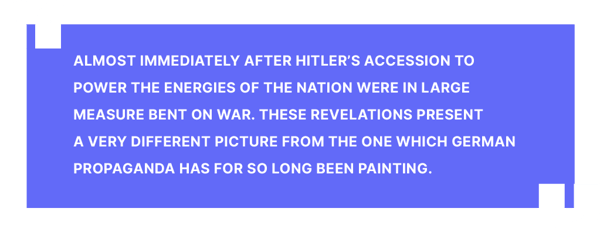
December 1944: An excerpt of Dan’s enemy broadcast analysis from December 1944.
January 1, 1945: A page from Dan’s report of Hitler and Goebbel finally break a six-month media blackout with a speech that claims the Allies had lied about their territory gains — and that Germany would prevail. The speech offered no information on the battlefield situation or any hint that the Germans were losing the war, and it was nearing an end.
.png)
%20(1).png)
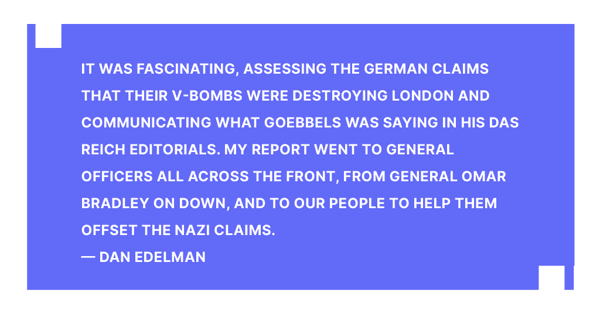

Dan wrote leaflets for the 5th Mobile Radio Broadcast Unit. They were written in English and translated into German, and dropped over German towns via bombers. These leaflets alerted the enemy that shelling will take place: "Get out of Range." The success of the leaflets distributed by the psychological warfare division was recognized as an effective combat tool.
April 30, 1945: Hitler is found dead.
-1.png?height=1700&name=HITLER%20VDEAD%20(2)-1.png)
1945: VICTORY
In 1945, the War in Europe was declared over but the psychological warfare division wasn’t finished. The unit became the information control division. Dan and his unit were responsible for the control and restructuring of the German press, radio, theater, and film. In order to rebuild German media Dan would help develop and conduct opinion research surveys on the German people and former members of the press.
.png)
Dan's unit developed Frontpolt, a circulation created to combat propaganda, which would eventually become Der Spiegel after the unit had properly vetted a staff.
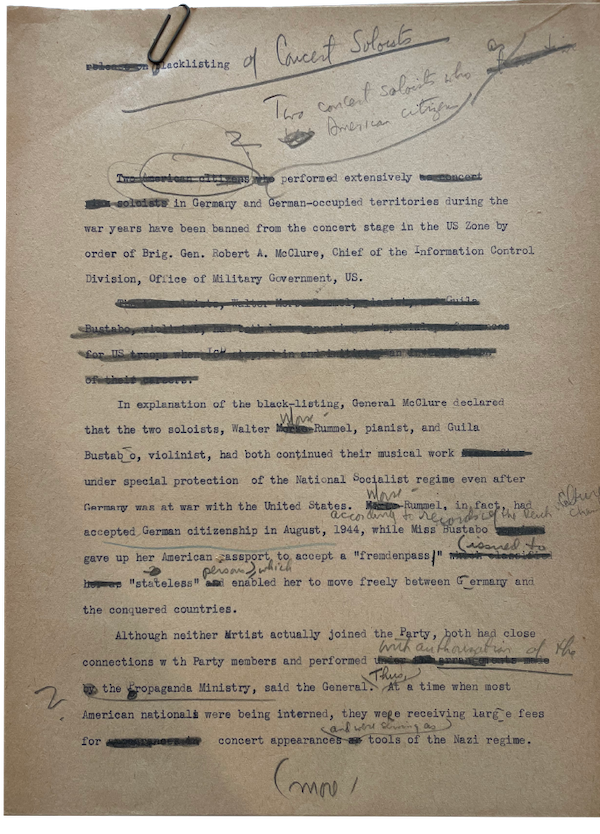
Spring/Summer 1945: During the rebuilding of German media and entertainment, the vetting of individuals determined their ability to return to their previous positions. Dan profiled individuals like Rummel and Bustabo — both soloists traveled and performed for the Nazi party.
.png)
July 20, 1945: The nightly broadcast reports became weekly summaries in the Spring/Summer of 1945. Dan continued to analyze and provide feedback on broadcasts.
The Allied Forces announced that reparations would be the first priority. The German prisoners of war would begin rebuilding Soviet towns and factories immediately. Dan’s report emphasized the need to ensure illegal radio broadcasts were being monitored.
December 24, 1945: Dan developed post-war surveys used to rebuild all factions of German media.
.png)
1945-46: NUREMBERG TRIALS
The Nuremberg trials were held by the Allies against representatives of the defeated Nazi Germany, for plotting and carrying out invasions of other countries, and other crimes, in World War II. Before the Nuremberg trials began, lawyers for the defense began to gather witnesses. Dan conducted profiles on the individuals detailing their whereabouts during the Nazi regime. The lawyers attempted to show the defendants believed they served a good cause and that the Nazi party had no criminal character. The interviews made it clear these claims were entirely false; the Nazi party kept detailed logs which contained dates, locations, and daily activities of party leaders. The trial lasted eleven months, and the evidence included more than 600 prosecution exhibits, 1,400 defense exhibits, and the testimony of more than 100 witnesses.
December 8, 1945: Dan proposed that a press conference be held to survey public opinion on the Nuremberg trials. An estimated 400-500 individuals were surveyed by the Information Control Division; 81% of those surveyed believed the trials would be fair.
.png)

.png)
December 28, 1945: Interviews with German community leaders were held to gauge their opinion of the trial. One individual was a journalist who had little hope the trials would matter to most Germans, but remained optimistic that it would be an opportunity for many to gain insight on the history of the previous twelve years.
-1.png)
November 20, 1945: Seating Chart of Defendants at Nuremberg. Dan made annotations of the defendants during the trial and developed profiles of each individual.
1946: BERLIN
In 1946, Dan was transferred to Berlin where he became a reports officer. He compiled his postwar surveys and work on psychological warfare into reports that would be circulated to his officers.
.png)
January 15, 1946: The Information Control Division concluded after evaluation that the foremost conductor, Wilhelm Furtwängler, would not be permitted entry into the United States, citing his strong ties to the enemy party, including holding a titled position within the party.
Dan surveyed different media factions to determine their postwar sympathies. Working with psychiatrists, Dan and his unit created profiles that would be used to establish if someone would be suitable for their previous role.
.png)
As a reports officer, Dan compiled his opinion research surveys, which were used by information control to rebuild media platforms.

1946: RETURNING HOME
After completing work in Berlin, Dan returned to the United States in the Spring of 1946. His awards included an Army Commendation ribbon, ETO ribbon with four battle stars, Germany occupation ribbon, American Theater ribbon, and the Good Conduct Ribbon. His voyage home would bring the next chapter in his legacy.
March 1, 1946: A letter of commendation was written by General Adcock to acknowledge the work Dan had done in the Intelligence Unit, highlighting his exceptional daily intelligence reports and ability to act as a liaison between the Army and the press.
.png)
